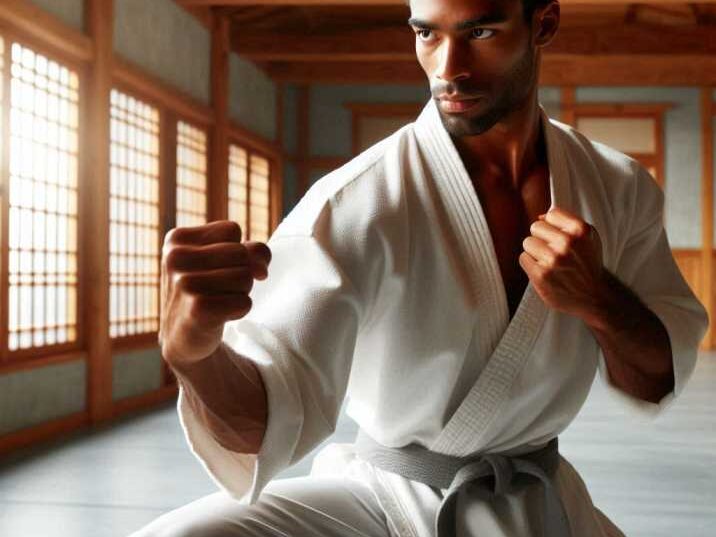Kung Fu, one of the most ancient and revered martial arts, is often seen as a form of self-defense. However, it offers much more than just the ability to protect oneself. In recent years, people have become increasingly aware of its numerous health benefits. From enhancing physical strength to improving mental well-being, Kung Fu has the potential to transform lives in profound ways. Whether you’re looking for a new way to stay fit or seeking a holistic approach to health, Kung Fu is a fantastic choice.

In this blog post, we’ll explore the many health benefits of practicing Kung Fu. We’ll dive into how it enhances physical fitness, strengthens mental health, boosts cardiovascular endurance, and much more. By the end, you’ll have a clear understanding of why this ancient martial art remains a powerful tool for health and well-being in the modern world.
Table of Contents
Table of Contents
- Introduction to Kung Fu: A Mind-Body Discipline
- Physical Health Benefits of Kung Fu
- Strength and Muscle Development
- Flexibility and Agility
- Balance and Coordination
- Cardiovascular Health and Endurance
- Mental Health Benefits of Kung Fu
- Stress Reduction
- Mental Focus and Discipline
- Confidence and Self-Esteem
- Kung Fu as a Holistic Exercise
- How Kung Fu Can Support Weight Loss
- Building a Strong Immune System Through Kung Fu
- Improved Joint Health and Mobility
- Enhanced Reflexes and Reaction Time
- Better Sleep Quality
- Conclusion
- Frequently Asked Questions (FAQs)
1. Introduction to Kung Fu: A Mind-Body Discipline
Kung Fu is a martial art that has been practiced for over 4,000 years, originating in China. Traditionally, it was developed for self-defense, military training, and spiritual development. What makes Kung Fu unique is its focus on the unity of mind and body. While physical techniques are at the core, mental focus and discipline play an equally important role.
When you practice Kung Fu, you’re engaging both your body and your mind. This dual focus allows Kung Fu to offer extensive benefits that go beyond the average workout. It’s a full-body exercise that can improve your physical fitness, but it also has a profound impact on mental health and emotional well-being.
2. Physical Health Benefits of Kung Fu
Strength and Muscle Development
Kung Fu is a full-body workout that engages various muscle groups simultaneously. The repetitive striking, kicking, and blocking movements help in building lean muscle mass, especially in the arms, legs, and core. Unlike weightlifting, which focuses on isolated muscles, Kung Fu works multiple muscles at once, promoting functional strength. This type of strength is useful not just for martial arts, but also for daily activities.
Flexibility and Agility
Many Kung Fu techniques require a wide range of motion, improving flexibility over time. Stretching routines are a common part of Kung Fu training, helping to loosen tight muscles and improve overall mobility. Flexibility reduces the risk of injury and enhances your ability to perform everyday tasks. Agility is another benefit, as quick, fluid movements help to improve reaction times and overall body control.
Balance and Coordination
Kung Fu emphasizes balance, especially in stances like the horse stance and crane stance. Practicing these stances over time improves your ability to maintain balance in both static and dynamic positions. Kung Fu also requires a high degree of coordination between your arms, legs, and mind. The coordinated movements strengthen your neural pathways, helping you to react faster and more precisely in various situations.
3. Cardiovascular Health and Endurance
Kung Fu is not just about strength and technique; it’s also an excellent form of cardio. The constant movement and intense physical exertion elevate your heart rate, improving cardiovascular health. Practicing Kung Fu regularly can increase your lung capacity, enhance blood circulation, and strengthen your heart. Over time, this reduces the risk of heart disease, hypertension, and other cardiovascular conditions.
Kung Fu also boosts endurance. As you progress in your training, you’ll notice your ability to sustain prolonged periods of physical exertion improves significantly. This increased endurance can benefit not only your martial arts practice but also other areas of your life, such as sports and daily physical activities.
4. Mental Health Benefits of Kung Fu
Stress Reduction
One of the most immediate mental health benefits of Kung Fu is its ability to reduce stress. The physical activity combined with mindful breathing and concentration techniques can help you unwind after a long day. Kung Fu teaches you to control your breath, calm your mind, and focus on the present moment. This type of mindful practice is similar to meditation and can help alleviate anxiety and stress.
Mental Focus and Discipline
Kung Fu training is a discipline that requires dedication and perseverance. Through regular training, you develop mental focus and the ability to stay calm under pressure. This mental training extends beyond the dojo and into your everyday life. You’ll find yourself better able to concentrate at work, school, or during stressful situations. Kung Fu teaches you to clear your mind, allowing you to focus on the task at hand.
Confidence and Self-Esteem
Mastering Kung Fu techniques takes time, effort, and practice. As you improve, you build self-confidence and a sense of achievement. Whether you’re learning a new form or successfully defending against an opponent, each victory boosts your self-esteem. Additionally, Kung Fu teaches respect for oneself and others, fostering a positive attitude and greater self-awareness.
5. Kung Fu as a Holistic Exercise
Kung Fu is not just about physical fitness; it’s a holistic exercise that benefits the mind, body, and spirit. The spiritual aspect of Kung Fu training emphasizes inner peace, balance, and harmony. By practicing Kung Fu, you’re not just working out your body; you’re nurturing your mental health and emotional well-being. The combination of physical exertion and mindful meditation creates a sense of inner calm, helping to improve your overall quality of life.
6. How Kung Fu Can Support Weight Loss
Kung Fu training is a highly effective tool for weight loss. The constant movement and high-intensity workouts burn calories and fat. With regular practice, you can achieve significant weight loss and improve your body composition. Moreover, Kung Fu training boosts metabolism, meaning you’ll continue to burn calories even after your workout has ended.
Additionally, Kung Fu helps develop lean muscle mass, which increases your resting metabolic rate. This means you’ll burn more calories even when you’re not exercising. When combined with a healthy diet, Kung Fu can be a powerful tool in your weight loss journey.
7. Building a Strong Immune System Through Kung Fu
Regular physical activity is known to strengthen the immune system, and Kung Fu is no exception. The combination of cardiovascular exercise, muscle strengthening, and stress reduction helps boost your immune function. Studies have shown that moderate, regular exercise can help your body fight off illness more effectively. By practicing Kung Fu consistently, you’re giving your immune system the support it needs to stay strong.
8. Improved Joint Health and Mobility
Kung Fu’s emphasis on flexibility and fluid movements helps to maintain and improve joint health. As you practice various stances and motions, your joints go through a full range of motion, which increases lubrication in the joints, reducing stiffness. This makes Kung Fu an excellent practice for people looking to prevent joint issues or manage existing conditions like arthritis. Additionally, the low-impact nature of many Kung Fu forms makes it easier on the joints compared to other high-intensity workouts.

Benefit: Improved joint mobility reduces the risk of injuries and promotes long-term health, keeping your body agile as you age.
9. Enhanced Reflexes and Reaction Time
Kung Fu involves quick movements that require you to respond rapidly to your opponent or surroundings. Whether you’re blocking strikes or performing fast-paced forms, the practice continuously improves your reflexes and reaction time. These quick responses aren’t just useful in martial arts—they also help in everyday activities, from driving to sports, where fast reflexes can make all the difference.
Benefit: Faster reflexes and better reaction times help you respond quickly to physical threats or unexpected situations in daily life.
10. Better Sleep Quality
Regular Kung Fu training has been shown to improve sleep quality. The combination of physical exertion and mindful breathing helps regulate the body’s circadian rhythms, promoting better sleep. Moreover, Kung Fu reduces stress and anxiety, two common causes of insomnia. After an intense training session, your body is tired and your mind is relaxed, making it easier to fall asleep and enjoy deeper, more restorative sleep.
Conclusion
Kung Fu is much more than a martial art. It is a powerful form of exercise that promotes both physical and mental well-being. Whether you’re looking to improve your cardiovascular health, build strength, lose weight, or reduce stress, Kung Fu has something to offer. Its holistic approach to health makes it a great choice for anyone looking to enhance their overall quality of life. So, if you’re considering starting a martial art, Kung Fu might just be the perfect fit for you.
Frequently Asked Questions (FAQs)
1. Can beginners practice Kung Fu?
Yes, Kung Fu is suitable for beginners. Many schools offer beginner-level classes that focus on basic techniques and gradually build up to more advanced movements.
2. How often should I practice Kung Fu for health benefits?
Practicing Kung Fu 2-3 times per week is ideal for most people. However, the frequency can vary based on your fitness goals and availability.
3. Is Kung Fu safe for all age groups?
Kung Fu can be adapted for different age groups and fitness levels. It’s important to practice under the guidance of a qualified instructor to ensure safety, especially for older adults and children.
4. How does Kung Fu compare to other martial arts for health benefits?
Kung Fu offers a unique blend of physical, mental, and spiritual benefits. While other martial arts may focus more on combat or physical strength, Kung Fu emphasizes balance, flexibility, and mindfulness, making it a well-rounded option for health and fitness.
5. Does Kung Fu help with mental clarity?
Yes, Kung Fu training involves a high degree of mental focus and concentration. The combination of physical activity and mindful breathing can help improve mental clarity and reduce stress.


